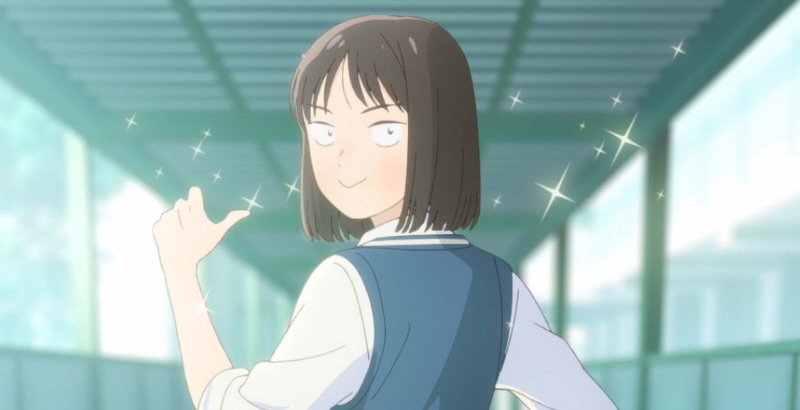
Skip and Loafer Episode 10 embodies what best exemplifies the magic of the series. Mitsumi (Tomoyo Kurosawa)and Shima (Akinori Egoshi) don’t make sense as friends on paper, a fact pointed out to them. She’s naive and overcome with the possibilities of living in Tokyo while he sits on his cynicism, unimpressed by the bustle surrounding them. Her dreams keep her racing ahead, fearless in the face of stumbling, while his creative passion has already been snuffed out by the ripe age of 16. She’s eager, and he’s apathetic, her goals relentless in their ambition compared to his disinterest. Both are kind, their people-pleasing personality traits being one of their many similarities despite their intent — Mitsumi says yes because she wants to be helpful, and Shima says yes to stay well-liked but under the radar. In “Scrambling and Dripping,” the series gives us the best demonstration of how they complement and contradict one another.
The episode is consumed by the school festival as Mitsumi’s class prepares to put on a musical performance. Shima has been roped into it, put on the spot, and now taking on the role of one of the male leads. Mitsumi has busied herself to the point of exhaustion, the crevices under her eyes deepened with an exaggerated flourish by the animation team, the shadows becoming their accessory to the character. This leads her to take on more than she can handle, offering to watch over rehearsal footage. As is expected, when pushed to the limitations of how much time exists in a day, Mitsumi falls asleep while working on another project and cannot pass on any notes.
She, along with Shima, overhears the director of the musical expressing disappointment. In yet another instance where the show forgoes forced drama, the characters expressing their frustration are never even angry so much as caught up in their stress. Still, it knocks Mitsumi down, and more so when she realizes Shima did too, his seeking her out to distract her being the catalyst to her eventual tears. Her fatigue and concerns over being unreliable manifest through her additional realization that Shima probably didn’t want to be in the show, and she didn’t do anything to help him. One of the most aggravating traits of being human — especially in our adolescence — is how emotions spill over in ways that don’t match our feelings. Embarrassment launches anger, and anger triggers tears. We’re all just messes of feelings, which Mitsumi demonstrates even if Shima doesn’t understand.
The moment paves the way for one of Shima’s best and worst moments, even if the latter is through internal dialogue only. He watches this girl, who he’s grown fond of, cry and can’t help but think back to his younger self, who needed someone to look after him, and projects those emotions onto her. He wonders why she wants to be in Tokyo anyway if she will be reduced to tears over what he believes are little moments not worthy of remarking on. In a selfish moment that speaks more to not wanting to see himself reflected, he can’t help but think she’d be better suited back in her hometown, surrounded by nature.

But then he also tries to lift her spirits, performing one of his numbers from the musical and convincing her to join in, even though she doesn’t know the lyrics. The animation throughout all of the musical moments is superb. Their hidden dance is pocketed in the staircase they frequent, lit by the warm sunset shades that have become their colors. The animation uses a more watercolor approach to show his rehearsal time, emulating classic artwork for movie posters.
Shima is kind, but he has a lot to learn about the world around him. He may still see Mitsumi as naive to the world around her, but she teaches him even when she doesn’t realize it. He sees her as someone always racing for something, a facet of her he’s witnessed since his first encounter with her as he watched her sprint for the entrance ceremony. Now it’s November, and she’s telling him that since she has a habit of falling on her face from the speed she operates, she’s developed an ability to dust herself off. Her sharing this piece of herself that she knows well allows him to see her in a different light while also allowing himself to see the better parts of the younger him. He may have been disillusioned at a young age at the idea of acting, especially as it began to be something to distract his mother from her pain. Still, with Mitsumi’s leading example, maybe he too can learn to dust himself off from the past hurdles and triumph in the present.
Mitsumi can go up to the girls who’d promised feedback to apologize for her delay while delivering the notes she’d come up with. The character isn’t just refreshing at this point, but something of a revelation compared to other characters in the same genre, all due to Misaki Takamatsu, writer and illustrator of the manga. In “Scrambling and Dripping,” Shima also learns this fact while continuing to recognize his own capacity for growth. That said, with the countdown to the festival over the end credits and the shot of his mother finding the pamphlet of the show in his room, the optimistic energy the episode ends on is poised to be challenged in the upcoming installment.
Skip and Loafer Episode 10 excels in the character development of Mitsumi and Shima as their stories continue to parallel, the writing crafting situations in which they can superbly mirror one another’s experience. Despite so much time that has passed so far in the show, there’s still so much left to discover about these characters and how their past informs their present, in Shima’s case, while Mitsumi learns to balance present-day complications better to achieve her goals. “Scrambling and Dripping” is as heartfelt and empathetic as the episodes that have come before. Still, the promise of greater developments allows it an edge of tension that further invigorates the story.
Skip and Loafer Season 1 is available now on Crunchyroll.
Skip and Loafer Episode 10
-
Rating - 10/1010/10
TL;DR
Skip and Loafer Episode 10 excels in the character development of Mitsumi and Shima as their stories continue to parallel, the writing crafting situations in which they can superbly mirror one another’s experience






